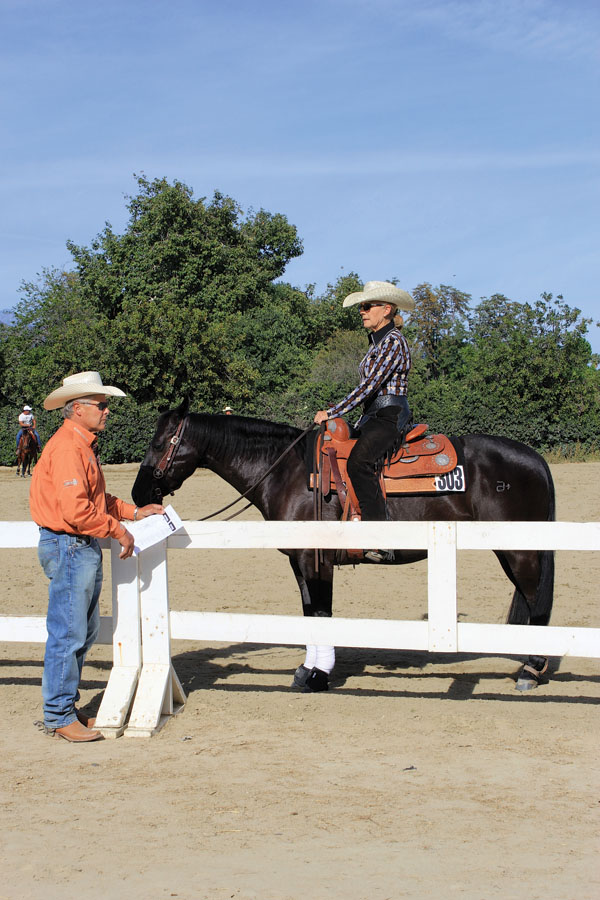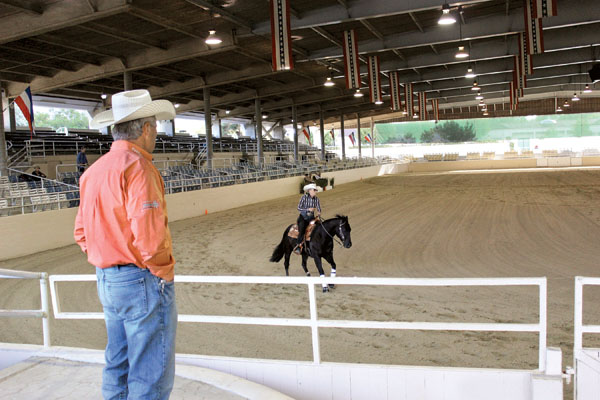Throughout my career, I’ve worked with riders whose goal is to show and win. I’ve given them lessons, trained their horses, taken them to shows, and done what I can to prepare them for the show pen.
[READ: Help & Motivation to Show Horses]

Some were successful and others weren’t—and among the latter have been riders with the most money, the fanciest horses, and the biggest goals. What makes the difference?
My answer is that learning to show is a process, not a purchase. It takes time, sweat, sometimes tears, and I don’t know of anyone who’s learned to show well without commitment to it.
To succeed, you must develop and build on a complex set of skills, not just one or two; the ability to guide your horse through a pattern, or to walk, jog, and lope on the rail is merely the “A” in your showing alphabet.
You also have to learn how to prepare and warm up your horse, how to keep him healthy and comfortable away from home, how to focus and control your emotions, how to correct or school errors in the show pen, how to handle bad ground and weather, how to deal with mistakes and setbacks, how to face tough competition…the list goes on and on from here.
I’m not saying there are any big shortcuts. But I do know five steps you can take that will make your learning process itself go better, and help smooth the road to success.
[READ: Goal Setting Tips for Riders]
How to Help Yourself
1. Find someone to teach you the ropes. If you can’t afford to hire a pro and keep your horse with him or her, seek mentoring from the most experienced person you can find. By attempting to learn to show on your own, you inevitably make mistakes that can turn into bad habits for you and your horse alike. Then you’ll have to take many steps backward to unlearn those bad habits before you can replace them with good ones. It seldom pays to work with a rookie, either—that’s like starting first grade with another first-grader as the teacher.
2. Don’t try to out-think your adviser. Whether you hire a trainer or find a good non-pro mentor, respect the advice you’re given for what it is—guidance based on the specialized experience you don’t have yet. Trust the advice and try it before going into overdrive on the alternatives. If you’re an especially smart thinker, maybe someone who’s already achieved success in other areas, you might be used to getting somewhere by using your head alone. It doesn’t work that way with learning to show.
3. Allot yourself the time required. I understand that the world is busy and that everyone has more to do than make it to the barn on a regular basis. Even so, if you’re going to undertake learning to show, or want to show better than you do now, you can’t shortchange yourself on time. We use a saying at my barn: “The non-pros who ride are the non-pros who win.” I ask customers who want to show to commit to two lesson rides a week. If you find yourself skipping lessons or making excuses not to ride on a regular basis, I guarantee you’ll pay for it later. It’s like skipping class in college and then being in trouble at test time.
4. Work with a suitable horse. I’ve known many people with the dream of showing a young horse they’ve raised themselves. This can have a happy ending when the owner is an experienced show hand, but not when the owner is as green as the horse. If you haven’t shown, there’s no better teacher than an oldie-goldie show horse. Even if you’ve shown a lot, but now want to step up to a higher level of competition, you’ll learn faster and enjoy it more on a horse you’re not trying to train at the same time.
5. Show at the level that’s fairest to you. Every horse show is a learning situation, but you don’t necessarily have to take your first lessons and first licks at a world show or a major futurity. Local and regional shows are great stepping stones to learning, helping you build your confidence. Learning to show is largely about getting mileage in the show pen, which takes a long time to earn if you aim only at one or two big shows a year. The same is true if you aim just at one or two small shows that don’t challenge you.

A multiple AQHA world champion, Avila has also won three NRCHA Snaffle Bit Futurities, the NRHA Futurity, and two World’s Greatest Horseman titles. He received the AQHA Professional Horseman of the Year honor. His Avila Training Stables, Inc., is in Temecula, California. Learn more at bobavila.net.

